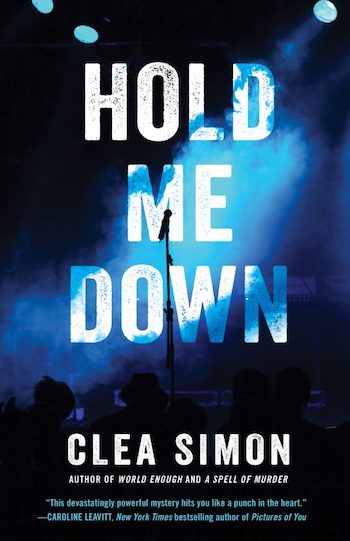Book Review: Rock and Roll Fantasy — Getting the Balance Right
By David Daniel
On many levels, Hold Me Down is terrific. Its power lies in the vitality of Clea Simon’s prose and her insider savvy.
Hold Me Down by Clea Simon. Polis Books, 248 pages, $26.99
Among the subgenres of popular fiction, the most difficult to write may well be the rock and roll novel. It offers a unique challenge: how to translate the anarchic burn-down-the-mission energy of the genre to the slower, linear, more cerebral medium of prose. Books that have most successfully bridged that divide often take the form of mysteries or thrillers. Among the best are P.F. Kluge’s Eddie and the Cruisers, Peter Abrahams Hard Rain, Lewis Shiner’s Glimpses, and George R. R. Martin’s brilliant The Armageddon Rag — all from the ’80s and ’90s, all written by men (more on that point later). These fictions gather their motive force from some kind of attention-getting violation and then dive into the ensuing puzzle. Their story arcs race along toward a solution, with plot and characterization embracing the anarchistic particulars of the music. Clea Simon’s gritty Hold Me Down stays true to this pattern.
Gal Raver, the novel’s provocatively named protagonist, is 20 years past her sell-by date. That was the period when she and the all-female punk band she fronted, having emerged from the Boston/Cambridge bar scene and riding high on the buzz of several big hits written by Raver, filled arenas across North America. Young, ambitious, and indefatigable, the women learned to love the life: “Drunk, sick, tired — none of it mattered once [the drummer] counted off the beat.” As Gal reflects, “They may have left town pariahs, but suddenly they were conquering heroes. Or heroines. Babes who could rock. At any rate, nobody yelled at them to take their shirts off. Nobody shouted, ‘Suck my dick!’”
Success, of course, breeds indulgent transformations — like a growing reliance on pills and booze. Gal recollects how easy it became “to fall into the routine. Walk into a radio station, drink in hand, greasy jeans hanging low like a dare. Unshowered, still high from the night before. Not only did it not detract from her appeal, it enhanced it. This was rock and roll, after all.”
But that was then. Glory days in the rearview, her band defunct these many years, Gal lives alone with a cat and plays only on occasion (in a coffee house). Her romantic life is now an ambivalent relationship with a local carpenter. It’s something, but not much. When the band’s original drummer dies of cancer, the others conceive a reunion concert, a fundraiser in Boston for her orphaned daughter and ex-husband.
On stage the night of the benefit, Gal recalls the past, assesses what’s been lost and gained, and calculates the cost. With the clarity of hard-won sobriety, she now appreciates the energy that flows from performers to audience and back again — it is the electric loop she used to live for. She has missed it. Thus musing, she happens to notice a face in the crowd that she recognizes — or does she? The next day, wrapping up the financial details of the gig before she returns home, Gal learns that somebody was killed after the concert. She’s sure it was the person she noticed in the crowd. For reasons not immediately clear, she undertakes a somewhat reluctant journey through the past.
Gal is an appealing protagonist. She has toughness and attitude in spades, yet she is vulnerable too, in ways that we learn via the story’s limited-third-person-POV construction. The narrative continually slips from present to past. Time has softened some of the edges of the persona she had constructed, but she isn’t ashamed of what she was. At one point, Gal muses: “Yeah, she was fearless. Fearless as fuck. There wasn’t a boundary she didn’t push, a line she didn’t cross. And, hey, she survived, didn’t she?”
Simon knows the punk music milieu well, rendering it with convincing realism no doubt gleaned from her own days as a rock critic. She adds an insightful female context to what is still a male-dominant world. Beyond the usual creative and personality differences that bedevil most touring bands are the further challenges of pregnancies, chauvinistic promoters and record execs, and misogynistic fans. The grind is the same: lugging gear, motels, endless bus rides, too many drugs, too much sex; and Simon’s eye doesn’t flinch.

Clea Simon and friend. Photo: Amazon
The book reads fast. Her scenester’s savvy keeps it moving along with short chapters and a knack for supplying crisp details. Character development is a particular strength. The transformation of Gal Raver from “mousy” high school girl, uncertain performer, and rookie songwriter to a powerhouse with a growing, growling confidence is strikingly effective. As is, at times, Gal’s self-lacerating anger. Once a blackout drunk, now sober, Gal is open to remorse over some of the wreckage she has wrought in relationships with bandmates, lovers, friends. “At times like this, she wonders what the program would say. Something about forgiving yourself, she figures. Maybe she should have joined up, all those years ago. Only now it seems a little late. She doesn’t drink. She’s in control. All she needs is absolution for all the bodies in her wake.”
Hold Me Down is not without flaws. In its purest heart, rock and roll is subversive, unruly, and the novel’s limited POV puts restraints on the drama by having much of the action (including the crime and its investigation) occur offstage. Accordingly, much of Gal’s activity in the present — sitting in coffee shops, thinking, making oblique conversation — begins to feel like mental hand-wringing. Given that this was an all-female band whose song titles include “Pig Brain,” “Rot Gut,” “C**t Hairs,” and “So Fucking Stupid,” there is a demand for some raw, real-time action to hammer the story home. And the plot revelations, while powerful on one level, are diminished somewhat because they lag behind what the reader has already begun to figure out — Simon supplies confirmation rather than surprise. Finally, the investigating BPD detective Bixby is a missed opportunity. Even in his brief walk-ons he generates considerable curiosity, as well as a latent sexual tension that could better be exploited.
That said, on many levels Hold Me Down is terrific. Its power lies in the vitality of Simon’s prose and her insider savvy, particularly the nuance of her observations. One example of this is when, after the benefit gig, Gal lovingly wipes down her battered old bass guitar, laying “the heavy solid body in its case, with its threadbare velvet and stickers from clubs long closed.” In other scenes, as the band is paying its dues, we experience those very clubs, with their smells of vomit, stale beer, and Pine-Sol.
Much the way early women rockers like Sister Rosetta Tharpe and Ruth Brown set up opportunities for later performers, like Janis Joplin, Suzi Quatro, Chrissie Hynde, and Joan Jett, to challenge the idea that rock was an exclusively male aesthetic, so Simon squashes anachronistic gender notions of who can write a kickass rock and roll fiction. Everyone’s heard the rock origin story — told ad nauseam by numberless guys in bands — about how the Beatles on Ed Sullivan’s show sparked a revolution. There’s a more compelling moment in Hold Me Down, when Gal straps on her bass, the instrument heavy and slung low across her hips. There’s enough sex and visceral longing in that posture to match any male rock and roll fantasy.
David Daniel is author of many books, including White Rabbit, a novel of the Sixties and Inflections & Innuendos, a collection of flash fiction. He teaches part-time at the University of Massaschusetts, Lowell and blogs regularly at richardhowe.com.

[…] to the ArtsFuse and David Daniel for this stellar in-depth […]